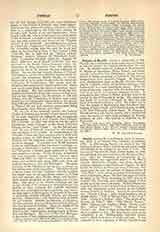

Finotti, JOSEPH M., b. at Ferrara, Italy, September 21, 1817; d. at Central City, Colorado, January 10, 1879. In 1833 young Finotti was received into the Society of Jesus in Rome, and for several years taught and studied in the colleges of the order in Italy. He was one of the recruits whom Father Ryder, in 1845, brought from Europe to labor in the Maryland Province. After his ordination at Georgetown, D.C., Father Finotti was appointed pastor of St. Mary’s Church, Alexandria, Virginia, and given charge of outlying missions in Maryland and Virginia. In 1852 he left the Society of Jesus and went to Boston. For many years he held the position of literary editor of “The Pilot”, while acting as pastor of Brookline and later of Arlington, Mass. The last few years of his life he spent in the West, becoming, in 1877, pastor of Central City, Colorado, and retaining charge of that parish up to the time of his death. Father Finotti was a great book-lover, giving much time to literary pursuits and displaying special interest in the Catholic literary history of America. Among his productions are: “Month of Mary”, 1853, which reached a sale of 50,000 copies; “Life of Blessed Paul of the Cross”, 1860; “Diary of a Soldier”, 1861; “The Spirit of St. Francis de Sales”, 1866; “The French Zouave”, 1863; “Herman the Pianist”, 1863; “Works of the Rev. Arthur O’Leary“; “Life of Blessed Peter Claver”, etc. Most of these publications were translated or edited by him. His best-known work, never completed, is his “Bibliographia Catholica Americana”, which took years of study and care. It was intended to be a catalogue of all the Catholic books published in the United States, with notices of their authors and an epitome of their contents. The first part, which brings the list down to 1820 inclusive, was published in 1872; the second volume, which was to include the works of Catholic writers from 1821 to 1875, was never finished, though much of the material for it had been industriously gathered from all available sources. His last literary effort, which he did not live to see published, entitled “The Mystery of Wizard Clip” (Baltimore, 1879), is a story of preternatural occurrences at Smithfield, W. Virginia, which is partly told in the life of Father Gallitzin.
EDWARD P. SPILLANE

